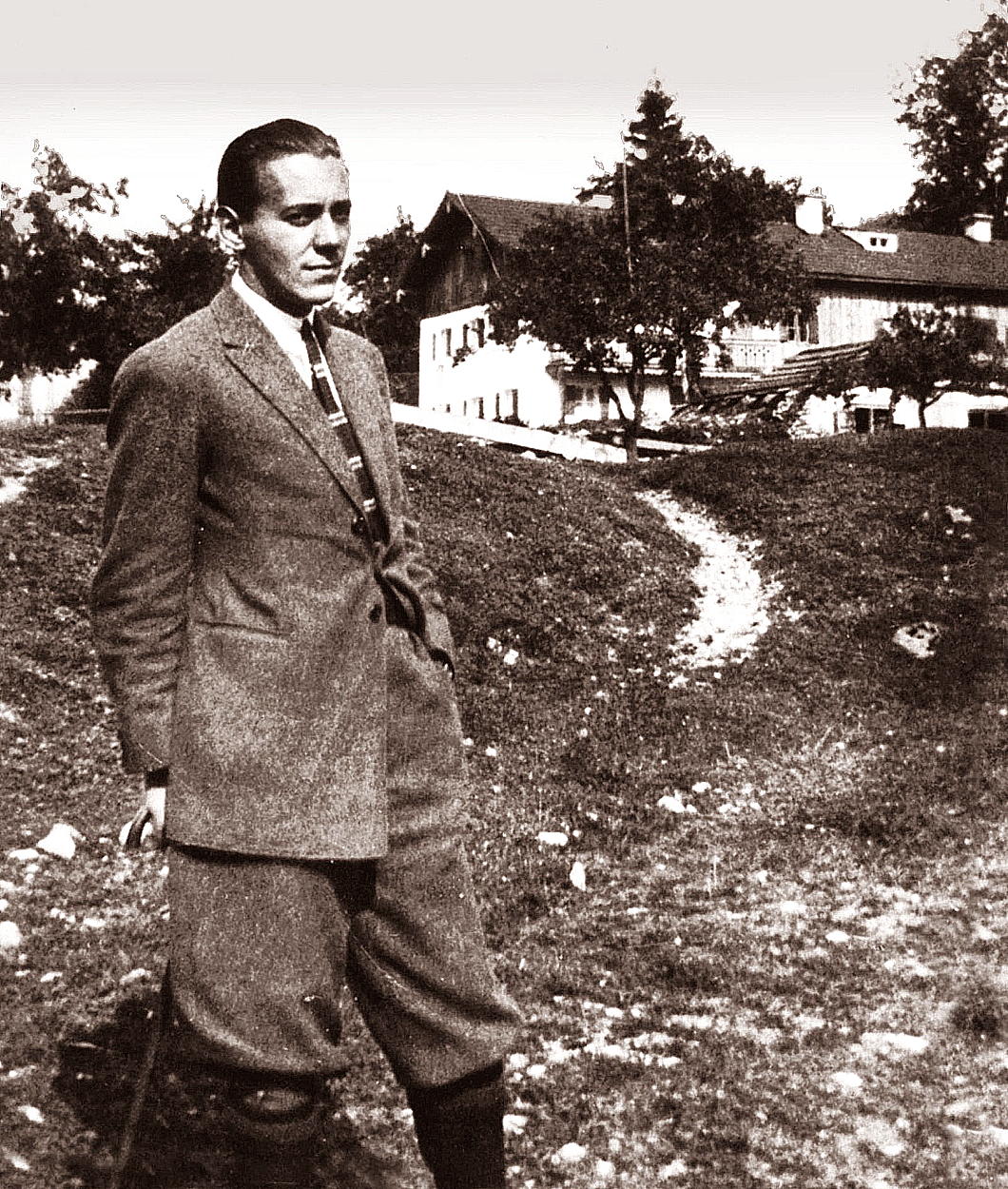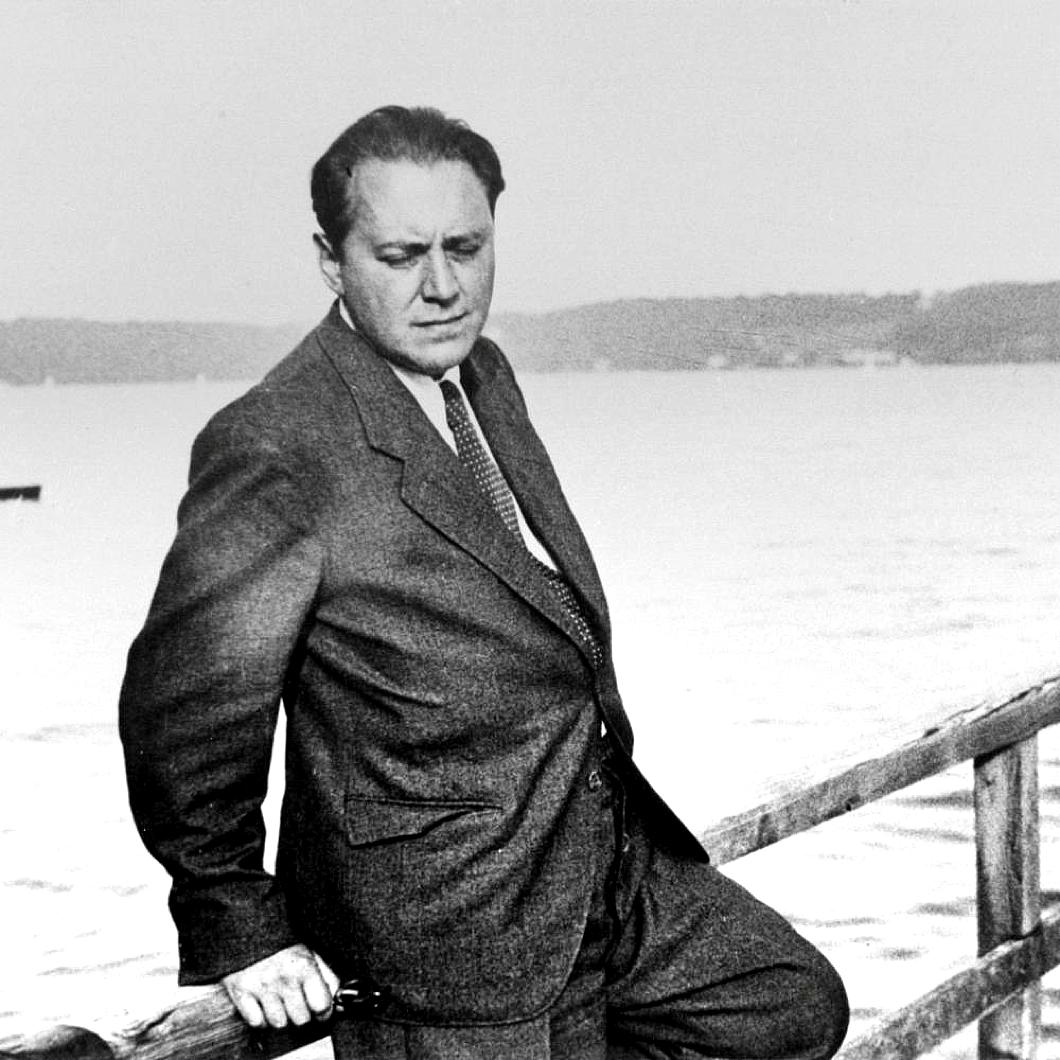Theatre
About Andrew Cusack
 Writer, web designer, etc.; born in New York; educated in Argentina, Scotland, and South Africa; now based in London.
Writer, web designer, etc.; born in New York; educated in Argentina, Scotland, and South Africa; now based in London. read more
News
Blogs
Reviews & Periodicals
Arts & Design
World
France
Mitteleuropa
Knickerbockers
Argentina
The Levant
Africa
Cape of Good Hope
Netherlands
Scandinavia
Québec
India
Muscovy
Germany
Academica
Ödön von Horváth
When the shop purveying diacritical marks opened one morning in Vienna, in my mind the writer Ödön von Horváth turned up and said “Thanks. I’ll have the lot.”
It wasn’t even his real name, of course — which was Edmund Josef von Horváth. A child of the twentieth century, von Horváth was born in Fiume/Rijeka in 1901. His father was a Hungarian from Slavonia (in today’s Croatia) who entered the imperial diplomatic service of Austria-Hungary and was ennobled, earning his “von”.
“If you ask me what is my native land,” von Horváth said, “I answer: I was born in Fiume, grew up in Belgrade, Budapest, Preßburg, Vienna, and Munich, and I have a Hungarian passport.”
“But homeland? I know it not. I’m a typical Austro-Hungarian mixture: at once Magyar, Croatian, German, and Czech; my name is Hungarian, my mother tongue is German.”
From 1908 his primary education was in Budapest in the Hungarian language, until 1913 when he switched to instruction in German at schools in Preßburg (Bratislava) and Vienna.
Von Horváth went off to Munich for university studies — where he began writing in earnest — but quit midway through and moved to Berlin.
He once told his friends the story of when he was climbing in the Alps and stumbled upon the remains of a man long dead but with his knapsack intact.
Intrigued, he opened the knapsack and found an unsent postcard upon which the deceased had written “Having a wonderful time”.
“What did you do with it?” his friends naturally inquired. “I posted it!” was von Horváth’s reply.

In 1931 he was awarded the Kleist Prize for literature, but two years later the National Socialists took the helm and von Horváth thought it best to move across the border to his old imperial capital of Vienna.
Despite his anti-nationalism, he did initially join the guild for German writers set up by the Nazis, possibly to keep his works in print in the Reich while he was living in still-independent Austria.
It was in Vienna he published his best-known work: Jugend ohne Gott — “Youth without God” (first translated into English as The Age of the Fish), which marked his public point-of-no-return break with the Hitlerites.
The novel depicts a jaded schoolteacher increasingly disconnected from his profession and the world around him as the ideology of National Socialism begins to take root in the education system. (Bizarrely, it was also scantly used as the basis for a 2017 dystopian thriller.)
When Hitler’s troops marched into Austria the following year, von Horváth fled to Paris.
“I am not so afraid of the Nazis,” he told a friend there one day. “There are worse things one can be afraid of, namely things you are afraid of without knowing why. For instance, I am afraid of streets. Roads can be hostile to you, can destroy you. Streets frighten me.”
Days later, in the middle of a thunderstorm, von Horváth was walking down the Champs-Élysées — the most famous street in Paris — when a flash of lightning struck a tree, felled a branch, and struck the writer dead. He had been on his way to the cinema to see Walt Disney’s ‘Snow White and the Seven Dwarfs’.
Years ago someone recommended The Eternal Philistine: An Edifying Novel in Three Parts to me, but I have to admit I haven’t yet read it, or much else of von Horváth’s work. (He’s on my fiction wish-list though.)
His plays have been revived, too — here in London at the Almeida and the Southwark Playhouse in the past decade or so — and both The Eternal Philistine and Youth Without God are available in English from the estimable Neversink Library imprint of Melville House.

Yellowfin
Flying blind by seeing a play you have no idea about and haven’t read up on is obviously a game of chance, but accompanying two mates to see Marek Horn’s new play ‘Yellowfin’ at Southwark Playhouse last night was an unexpected and thoroughly enjoyable delight.
It might just be me, but if I had been told the play was about three U.S. senators interrogating a smuggler of illegal fish substances I would have turned off completely and missed this winner.
Set in the familiar but not-too-distant future, ‘Yellowfin’ is a slow-release capsule of a not-terribly-fussed world following an inexplicable ecological disaster that, as it happens, turns out to be perfectly manageable.
It takes long and confident strides veering towards nihilism without quite touching it but the real joy is its almost-titillating scepticism of the eco-reorganisationalism that is all the rage now.
If nothing else, ‘Yellowfin’ is a deeply subversive play.

Production Photos: Helen Maybanks
Nancy Crane masters the role of the committee chairwoman whose intelligence never quite matches her confidence. Beside her is Beruce Khan as the smug younger colleague.
Nicholas Day supplies delicious nuggets of comic relief as an elderly senator not entirely sure of his surroundings. (Parallels to the most recent U.S. Senate alum to move into the White House are tempting.)
Joshua James is the fish-smuggling object of their inquiry who breezily pops the bubble of sententious seriousness the senators attempt to bring to the matter at hand.
Good writing, well acted. Let the record show ‘Yellowfin’ is well worth it.

Production Photos: Helen Maybanks
‘Five Finger Exercise’
The Print Room, Notting Hill (until 13 Feb 2016)
I remember as a child being confused when some people said they hated the holidays because it was awful having all the family together. The gatherings of our extended family were always occasions of mirth and merriment and not a few jibes — not to mention a long-term dispute over the precise location of Watertown, New York. The theatre of disfunctional families never hugely appealed to me, then, but over a few bottles of Erdinger in Kennington t’other night a friend dropped word of ‘Five Finger Exercise’ at the Print Room in Notting Hill (the old Coronet) and I thought I’d give it a go.
Peter Shaffer’s (‘Amadeus, ‘Equus’, etc.) play was first put on in 1958 under the direction of John Gielgud. The harmony of the Harrington family is not particularly upset by the arrival of a young German tutor Walter at the outset. Father Stanley — self-made man and head of a successful furniture company — is unbothered by his arrival at the instigation of the upwardly mobile mother Louise — imagine Mrs Bucket from ‘Keeping Up Appearances’ but half-French and with a cut-glass 1950s voice — who thinks it quite the done thing to have a live-in tutor teaching French to her daughter Pamela. The son Clive is just off to Cambridge so he’s all done and dusted and nothing to worry about. But then…
The remarkable thing about ‘Five Finger Exercise’ which makes it particularly close to life is how every character is effectively innocent and yet each character is to blame. Stanley has pursued work and the golf club while abdicating the rearing of children to his overbearing and pretentious wife, who is fixated into making sure they are just so. Clive has all the weaknesses of the typical self-obsessed teenager, but genuinely wants to love the father he feels only questions him. And Walter, so fixated with the mere fact of being in England and away from Germany and the past (and family) that he cannot see how his presence has upset a delicate balance. Little Pamela is mostly blameless, though.
Lucy Cohu as mother Louise is superb in voice, deportment, tone — everything. At first Jason Merrels (Stanley) fools the audience into thinking he is a settled old uncaring simpleton. But when push comes to shove Merrels displays the real emotion of the father who just doesn’t understand but wishes he could. Terenia Edwards is simply a delight — charming, sweet, and innocent, and perfectly conveying the hint that she may be on the cusp of something else. And I am surprised that the actor playing Walter (Lorne MacFadyen) is not German. (But then he was acting, I suppose.) Tom Morley, however, carried the weight of the play as Clive, taking a difficult role and giving us a convincing and credible performance. A brilliant actor.
The Director Jamie Glover deserves accolades for crafting a production that is fun, true to life, and, in the end, haunting.
A memorial to Conscience
Sharon Jennings’s new play on Franz Jägerstätter
It is often said that one man’s terrorist is another man’s freedom fighter — but what inspires the man who refuses to fight? Is he a coward? A man of conscience? Or a mere contrarian who goes too far? Sharon Jennings’s new play, ‘Memorial’, explores the surprisingly not yet well-known story of Blessed Franz Jägerstätter, an Austrian executed during the Second World War for his conscientious objection to military service under Hitler.
This clever telling frames the martyr’s life mostly in retrospect, as the Mayor (played by the very capable Joe Cushley) assembles the leading villagers of St Radegund (actors Richard Evans, Carianne Dunford, Richard Ward, and Meg Depla-Lake) to compile the list of names to be etched permanently in stone on the village’s war memorial. The list is finalised but there is one name that cries out to be remembered: their poor lamented Franz.
We meet the main character (played by Felix Dunning) both through the memories of his rural contemporaries and his own letters home to his wife during basic training. For his refusal to take the military oath of absolute obedience to Adolf Hitler, he is thrown into prison. ‘Memorial’ reaches its apex in the confrontation between the uncomplicated but principled Franz and his cunning and clever military judge (a role brilliantly performed by Gary Merry). The chilling battle between good and evil is made all too real and the viewer is reminded of the battles of conscience ongoing in our own lives and the lives of thousands of others every single day.
In the end, it is through the lens of his fellow villagers that we remember Franz. Why can’t he just sign the dotted line? All the rest of us did. It’s a mere formality. We didn’t have a choice!
Deviant? Rebel? Hero? Whatever we think of men like Franz, in this play Sharon Jennings has carved and crafted a memorial to conscience — a healthy but haunting reminder of that freedom which always remains even when all others disappear.
Search
Instagram: @andcusack
Click here for my Instagram photos.Most Recent Posts
- Burns Tower April 19, 2024
- Patrick in Parliament March 18, 2024
- Articles of Note: 13 March 2024 March 13, 2024
- Cambridge March 9, 2024
- Taken on Trust March 4, 2024
Most Recent Comments
Book Wishlist
Monthly Archives
Categories


